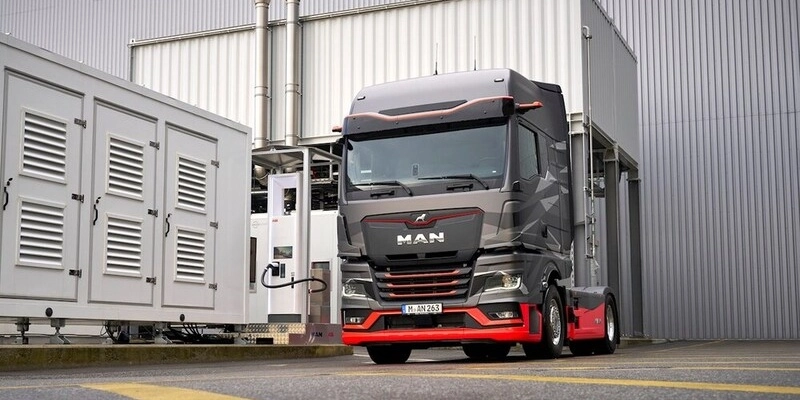German engineering, as well as the automotive industry, have always had a solid reputation.
In the electromobility sector, they were also achieving this leadership, but the removal of incentives in recent months has led, for example, to registrations starting to fall, harming their positioning.
According to the latest figures published by the German Association of the Automotive Industry (VDA), in the first quarter of 2024, sales of battery electric vehicles (BEVs) fell by 14 per cent.
In this context, ABB E-Mobility assures Mobility Portal Europe that with the Megawatt Charging System (MCS), “the industry in both Germany and Europe can become the leader in driving a sustainable long-distance transport”.
Recently, this company, along with MAN Truck & Bus, celebrated the premiere of the MCS, which is technically designed for charging capacities of up to 3.75 megawatts (MW) at 3,000 amperes (A).
According to the company as reported to Mobility Portal Europe, they are still conducting tests, for example, to enhance communication between the charger and the vehicle.

“It is about gaining experience both from vehicle as well as on charger side,” says Mona Streckert, Communication Lead DACH for ABB.
And she emphasizes, “With our charging session, we have proven that we are ahead of the market and that the MCS is a technology with enormous potential.”
During the demonstration, the companies achieved a charging power of over 700 kilowatts (kW) with prototype charging technology.
It is expected to be ready by early 2025, after which the certification process can begin.
In this way, ABB E-mobility and MAN have contributed their experience to the creation of the MCS standard in the international industrial association CharIN.
What led them to choose MAN as their partner for this project?
“MCS is a common effort, which is why we are working with different players of the entire industry,” explains Streckert.
In this case, the charging company and the commercial vehicle firm have signed an R&D cooperation and have been working for several years on both bus and truck electrification.
“Together, we drive the vision of a sustainable and economic future of transport that meet the requirements of our customers,” she says.

The goal, according to ABB, is to have 30,000 MCS charging points in Europe by 2030. Of these, around 4,000 would be installed in Germany.
“Nevertheless, the technology can only be successful if it is economic for all: logistics companies but also charging point operators (CPOs),” Streckert emphasizes.
And also if trust is built around it.
To lay the groundwork for broader deployment in the future, it is necessary to increase knowledge about the MCS and “bring it to the agenda of logistics companies, CPOs and, for sure, politics.”
In this regard, she details: “The close cooperation with truck OEMs, and especially with MAN, helps provide the market with reliable products.”
For this, the expansion and digitalization of networks will also be key, both for the future supply of renewable energy and for the deployment of charging infrastructure.
In this context, compliance with the Alternative Fuels Infrastructure Regulation (AFIR) is essential to enable sustainable long-distance transport.
“For a fast roll-out, it is crucial that we have clear requirements, where deviations from the frame regulation in European Union member states will be limited to an absolute minimum,” she states.
Will the MCS become a global standard?
According to ABB, Europe and North America have already committed to this standard, but “we should also aim at making it global.”
Once the certification process is ready to begin, the company prioritizes certification through external bodies to ensure an excellent and safe product.
“Massive deployment is also highly dependent on regulatory aspects such as grid connection, spacing, approval processes, and planning security,” indicates Mona Streckert.
What are the next steps?
The current prototypes are based on existing technology. Therefore, in the short term, there will be further development both in the power unit and in the charging post.
However, one of the most important steps is the finalization of the MCS standard, “which is key to develop the future product.”
“Partners in the industry are working together to define the technology, the ideal site layout, and more. The data gathered in these projects is crucial for a future rollout,” concludes the Communication Lead.








